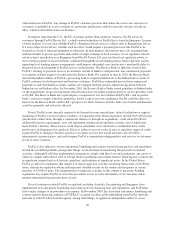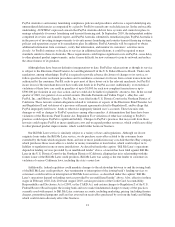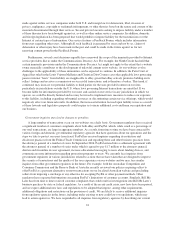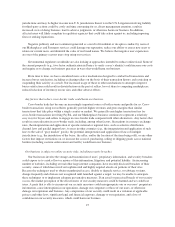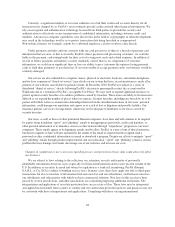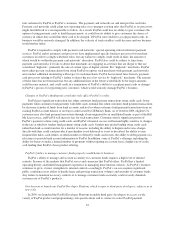eBay 2010 Annual Report Download - page 28
Download and view the complete annual report
Please find page 28 of the 2010 eBay annual report below. You can navigate through the pages in the report by either clicking on the pages listed below, or by using the keyword search tool below to find specific information within the annual report.We are subject to patent litigation.
We have repeatedly been sued for allegedly infringing other parties’ patents. Some of these ongoing suits
are described under the heading “Item 3 — Legal Proceedings” below. We are a defendant in other patent suits
and we have been notified of several other potential patent disputes, and expect that we will increasingly be
subject to patent infringement claims involving various aspects of our Marketplaces and Payments segments as
our services expand in scope and complexity. These claims, whether meritorious or not, are time consuming and
costly to resolve, and could require expensive changes in our methods of doing business, could require us to enter
into costly royalty or licensing agreements, or could require us to cease conducting certain operations.
Use of our services for illegal purposes could harm our business.
We may be unable to prevent our users from selling unlawful or stolen goods or unlawful services, or selling
goods or services in an unlawful manner, and we may be subject to allegations of civil or criminal liability for
unlawful activities carried out by users through our services. We have been subject to several lawsuits based
upon such allegations. In December 2004, an executive of Baazee.com, our Indian subsidiary, was arrested in
connection with a user’s listing of a pornographic video clip on that website. We continue to contest the charges
related to this arrest. Similarly, one of our Korean subsidiaries (IAC) and one of its employees were found
criminally liable for listings (which occurred prior to our acquisition of IAC) on IAC’s website. The German
Federal Supreme Court has ruled that we may have a duty to take reasonable measures to prevent prohibited
DVDs from being sold on our site to minors and that competitors may be able to enforce this duty. In a number
of circumstances, third parties, including government regulators and law enforcement officials, have alleged that
our services aid and abet certain violations of certain laws, including antiscalping laws with respect to the resale
of tickets, laws regarding the sale of counterfeit items, the fencing of stolen goods, selective distribution channel
laws, distance selling laws and the sale of items outside of the U.S. that are regulated by U.S. export controls.
Although we have prohibited the listing of illegal and stolen goods and certain high-risk items and
implemented other protective measures, we may be required to spend substantial resources to take additional
protective measures or discontinue certain service offerings, any of which could harm our business. Any costs
incurred as a result of potential liability relating to the alleged or actual sale of unlawful goods or the unlawful
sale of goods could harm our business. Certain manufacturers and large retailers have sought new U.S. federal
and state legislation regarding stolen goods that could limit our ability to allow sellers to use our sites without
confirming the source of, and their legal rights to sell, the underlying goods. In addition, from time to time we
have received significant media attention relating to the listing or sale of illegal goods and stolen goods using our
services. This negative publicity could damage our reputation, diminish the value of our brand names and make
users reluctant to use our services.
PayPal’s payment system is also susceptible to potentially illegal or improper uses. These may include
illegal online gambling, fraudulent sales of goods or services, illicit sales of prescription medications or
controlled substances, piracy of software and other copyrighted or trademarked goods, money laundering,
terrorist financing, bank fraud, child pornography trafficking, prohibited sales of alcoholic beverages or tobacco
products, online securities fraud and encouraging, promoting, facilitating or instructing others to engage in illegal
activities. There has been an increased focus by rights owners and U.S. government officials on the role
payments systems play in the sale of, and payment for, pirated digital goods on the Internet. Recent changes in
law have increased the penalties for intermediaries providing payment services for certain illegal activities, and
additional payments-related proposals are under active consideration by government policymakers. Despite
measures PayPal has taken to detect and lessen the risk of this kind of conduct, illegal activities could still be
funded using PayPal. Any resulting claims or liabilities could harm our business.
We are subject to risks associated with information disseminated through our service.
As discussed above with respect to certain specific issues, the law relating to the liability of online services
companies for information carried on or disseminated through their services is often unsettled. Claims could be
23









